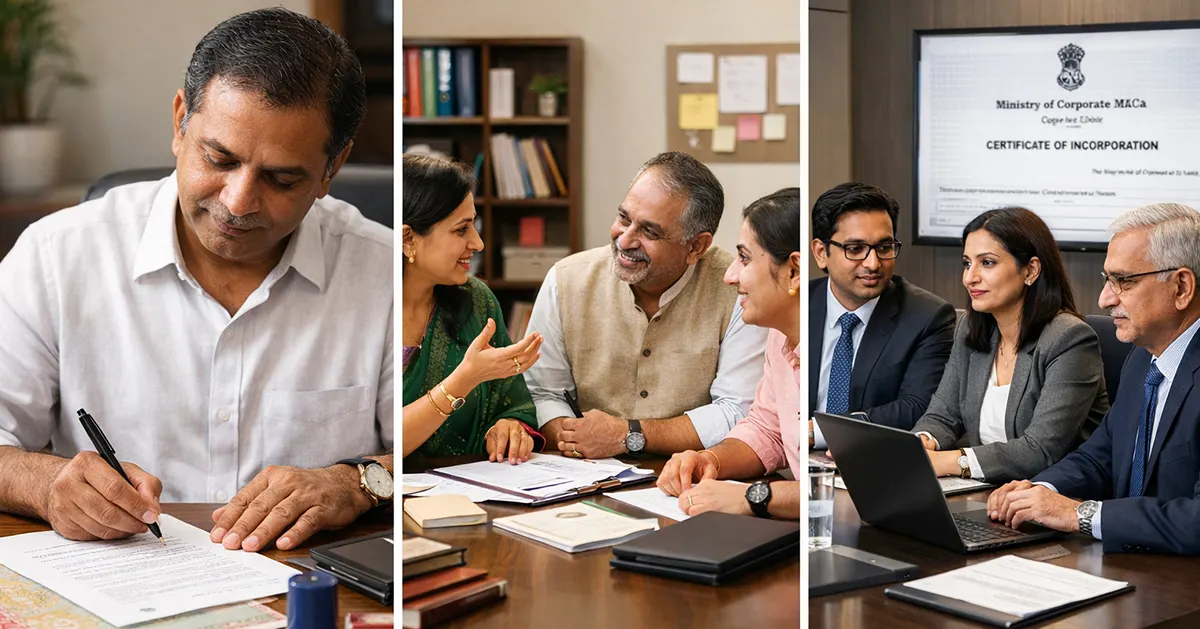
Introduction
India, a nation known for its diversity and socio-economic challenges, has a flourishing sector of Non-Governmental Organizations (NGOs) that aim to address these concerns. According to a 2020 study by NITI Aayog, more than 3.1 million NGOs are operating in India, highlighting the growing importance and influence of these entities in social welfare and development.
Understanding how to start an NGO is not only a noble initiative but also requires careful planning, registration, and compliance. Whether you’re driven by the mission of providing education, healthcare, environmental conservation, or social justice, understanding the legal and operational framework will be crucial to the success of your NGO.
This comprehensive guide outlines the 8 essential steps to help you get started with your NGO in India, backed by real-life examples, critical compliance information, and practical tips.
What is an NGO and Its Importance in India?
An NGO (Non-Governmental Organization) is a non-profit entity that operates independently from the government, typically focused on addressing social, humanitarian, or environmental issues. The role of NGOs in India is particularly significant due to the country’s vast challenges, including poverty, illiteracy, and healthcare disparities.
Key Importance of NGOs in India:
- Social Welfare: NGOs bridge the gap where government services may not reach, addressing critical issues such as child labor, gender inequality, and rural poverty.
- Policy Influence: Many Indian NGOs have influenced national policy on education, women’s rights, and environmental laws, thus driving systemic change.
- Community Engagement: NGOs work directly with grassroots communities, fostering sustainable development and empowerment.
Types of NGOs in India
When learning how to start an NGO, understanding the different types of organizational structures is crucial as they will influence the legal procedures, responsibilities, and scope of operations. In India, there are three primary forms of NGOs:
1. Trust:
- Legislation: Governed by the Indian Trusts Act, 1882.
- Purpose: Typically used for charity-based operations, especially in the fields of religion, education, and public welfare.
- Examples: Tata Trusts—focused on healthcare, education, and rural development.
2. Society:
- Legislation: Governed by the Societies Registration Act, 1860.
- Purpose: Suitable for educational, scientific, literary, and social welfare activities.
- Examples: CRY (Child Rights and You)—works for the rights and welfare of children across India.
3. Section 8 Company:
- Legislation: Governed by the Companies Act, 2013, and recognized as a non-profit company under Section 8.
- Purpose: Structured for professional and large-scale operations, often engaged in social enterprises.
- Examples: Teach for India—focused on education and youth empowerment.
- Pro Tip: If your NGO plans to engage in national or international programs or needs to raise large-scale funding, a Section 8 Company might be the best option for transparency and operational credibility.
How to Start an NGO and Get Funding?
Here’s a step-by-step guide on how to start an NGO in India:
Step 1: Define the Objectives and Vision of Your NGO
The first step in learning how to start an NGO is defining its objectives. This will guide your entire journey, from registration to fund allocation and the operational model.
Key Considerations:
- What social issue or problem will your NGO address?
- Who will benefit from your programs, and where will they be located?
- What is your long-term vision? For example: “To eradicate illiteracy in rural areas by 2035.”
Example:
An NGO focusing on women’s health may set objectives like: “To provide menstrual health education to 100,000 rural women in India by 2027.
Step 2: Choose the Right Structure for Your NGO
The next critical step is to choose the appropriate legal structure for your organization. This decision will impact your operations, governance, and fundraising methods. A proper structure ensures that you comply with the legal and taxation norms specific to your type of organization.
- Trust: Best for small-scale, charitable organizations.
- Society: Ideal for a membership-based NGO with a broader social focus.
- Section 8 Company: Preferred if your NGO needs to maintain professional operations or attract large-scale funding and corporate sponsorships.
Pro Tip: If you aim for a transparent, accountable, and professionally managed NGO, a Section 8 Company is a great option.
Step 3: Decide on a Name and Register It
The name of your NGO must be unique and meaningful, reflecting its mission and values. It should not conflict with any existing organization or trademark.
- Ensure that the name is distinct and aligned with the core work of the NGO.
- Conduct a name check on government websites or through platforms like RegisterKaro to confirm availability.
Example:
- An NGO working for child welfare may choose the name “Hope for Children Foundation”.
Once your name is decided, register it with the appropriate authority:
- Trusts: Local sub-registrar office.
- Societies: State-level Registrar of Societies.
- Section 8 Companies: Ministry of Corporate Affairs (MCA) via Form INC-12.
Step 4: Prepare the Required Documents for Registration
The documentation process varies by the type of NGO you are forming. Below are the common documents required for registration:
- Trusts:
- Trust Deed (duly signed by the founders).
- PAN card and Aadhaar card of trustees.
- Proof of address of the office premises.
- Societies:
- Memorandum of Association (MOA) and Rules & Regulations.
- PAN card, Aadhaar card, and photographs of members.
- NOC from the property owner.
- Section 8 Companies:
- MOA and AOA (Articles of Association).
- Identity and address proof of directors.
- Proof of the registered office address.
It is advisable to consult legal experts or services like RegisterKaro. to streamline the registration process.
Step 5: Register the NGO with the Relevant Authorities
The registration process for each type of NGO is distinct:
- Trusts: Register the Trust with the local sub-registrar office.
- Societies: Submit the registration application to the Registrar of Societies in the state.
- Section 8 Companies: Apply to the Ministry of Corporate Affairs (MCA) for incorporation.
Timeline:
- Trusts: Generally take 10–15 days for registration.
- Societies: Can take 15–20 days depending on state-level procedures.
- Section 8 Companies: 30–40 days, considering MCA’s processing time.
Step 6: Obtain Necessary Licenses and Certifications
After your NGO is registered, obtaining the necessary certifications will ensure legal compliance:
- 12A and 80G Certificates: These grant your NGO tax-exempt status and provide tax benefits to donors.
- FCRA License: If your NGO intends to receive foreign donations, it is mandatory to acquire an FCRA License.
- GST Registration: For NGOs with taxable income over ₹20 lakhs, GST registration is required.
Pro Tip: Applying for 12A and 80G should be done as soon as your NGO is operational to avail tax exemptions and encourage donor contributions.
Step 7: Open a Bank Account for Your NGO
A separate bank account is crucial for ensuring financial transparency. It helps you maintain accountability, track donations, and ensure that funds are being used for the intended purposes.
- Choose a nationalized bank that offers services for NGOs.
- Ensure that the account is in the name of the registered NGO.
Step 8: Plan Fundraising and Resource Management
Wondering how to start an NGO and get funding? NGOs require resources to fund their programs and activities. Fundraising can come through multiple channels:
- Crowdfunding: Use platforms like Ketto, Milaap, or GoFundMe to raise small amounts from many contributors.
- Corporate Partnerships: Collaborate with corporations for CSR initiatives.
- Grant Applications: Apply for government or international grants.
- Events and Campaigns: Organize fundraising events such as auctions, marathons, or charity dinners.
Example:
Smile Foundation has successfully raised funds through partnerships with corporations, providing ₹50 crore in 2022 alone for their education programs.
Compliance Requirements for NGOs in India
Navigating the legal and regulatory landscape is crucial for NGOs in India to operate transparently and achieve their objectives while gaining the trust of donors and beneficiaries alike.
- File Annual Returns: NGOs are required to file annual returns with the Registrar.
- Conduct Audits: Ensure regular audits to maintain financial transparency.
- Adhere to the Income Tax Act: Compliance with the Income Tax Act ensures that your NGO enjoys exemptions and privileges.
Pro Tip: Platforms like RegisterKaro offer audit and compliance services to ensure smooth operations.
Tips for Running a Successful NGO
Running a successful NGO goes beyond passion; it requires strategic planning, resource management, and building meaningful connections to create a lasting impact.
- Create a Strong Team: Build a motivated team that shares your vision.
- Leverage Social Media: Use platforms like Facebook, Instagram, and Twitter for awareness and campaigns.
- Evaluate Impact: Regularly monitor and assess the effectiveness of your projects.
- Stay Updated: Keep track of the latest regulations affecting NGOs in India.
Conclusion
Starting an NGO in India is an inspiring journey that can significantly impact social development. With the right legal structure, clear objectives, and effective fundraising strategies, your NGO can bring about meaningful change. Moreover, learning how to start an NGO in India is an inspiring journey that can significantly impact social development. With the right legal structure, clear objectives, and effective fundraising strategies, your NGO can bring about meaningful change. By following these 8 steps, you can turn your vision into a sustainable reality and contribute to social welfare in India.
By following the 8 steps outlined above, you can transform your vision into a sustainable reality, whether you’re working to alleviate poverty, improve education, or support environmental causes. The road to making a difference requires dedication, but with the proper guidance and resources, your NGO will thrive and help create a better future for India.




